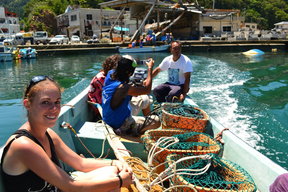Interview: Estelle Hebert

Estelle is a current JET, who is making use of her documentary film-making background to help the disaster stricken area of Tohoku. She launched Brighter Than Tomorrow, a fundraising campaign aimed to support the fishing village of Funakoshi. Her wish is to inform the international community of the on-going struggle this village faces post tsunami.
In this interview, Estelle tells us about the current conditions on the ground, the aims of her project, and her path to documentary film-making.
Q. Tell us a little bit about yourself and how you got into documentary film-making.
I had an interest in storytelling as well as humanitarian and social issues for as long as I can remember. After making my very first short doc as part of a Documentary class at Dawson College in Montreal, I realized then the power of the camera, and how it was possible to shed some light on issues and stories that needed to be told. I was inspired by all the positive feedback I had received, and it soon became a passion I couldn’t live without. Since then, I’ve had the great opportunity to work and collaborate on a variety of productions—for television, independent projects, etc.—while continuing my studies. In 2007, I moved to Toronto to pursue my studies in Documentary Media at Ryerson University. During that time, I collaborated with young refugees from all over the world, producing a radio/sound documentary. I then understood documentary as a collaborative effort more than anything else, and as a means of creating positive change within a community—big or small.
Q. For many of us, Japan has been everything from a way to escape the daily grind to a teaching career path to just plain japanophile-ism. What made you decide to go to Japan?

